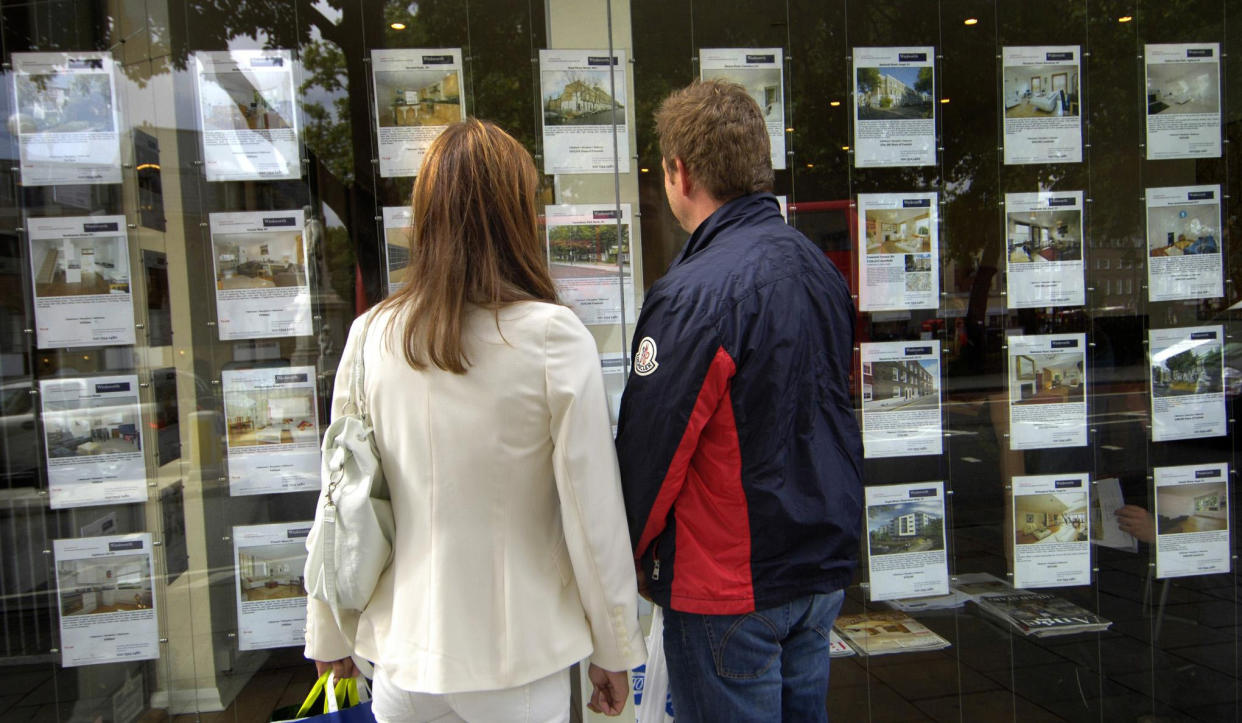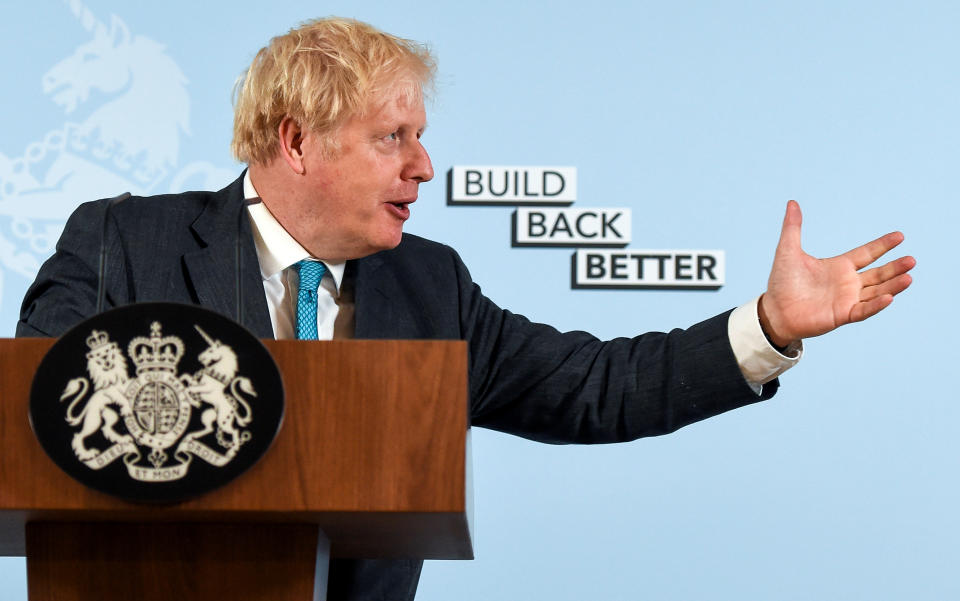Generation Buy: What low-deposit mortgage plans mean for buyers

Prime minister Boris Johnson’s promise to turn “Generation Rent into Generation Buy” will have gone down well with many Conservative members tuning into his virtual party conference speech on Monday.
He said new reforms would mark the “biggest expansion of home ownership since the 1980s,” in a nod to former Conservative leader Margaret Thatcher’s totemic right-to-buy policy in that decade.
New 5% deposit mortgages are likely to be popular with would-be buyers struggling to raise deposits. But it is not yet clear how the government will ensure banks start offering such loans — and experts warn measures to encourage them could prove controversial and counterproductive.
Help for renters living in ‘poor conditions’
Demand for new lower-deposit mortgages is certainly likely to be high.
Johnson told his party most people’s “overwhelming instinct” was to buy a home despite the flexibility of renting, with a “joy and pride” that comes from owning a home a home unavailable to many renters.
READ MORE: Boris Johnson promises biggest home ownership expansion since 1980s
New research from housing charity Shelter on Tuesday underlined the problems facing many with no choice but to rent privately in Britain, particularly on lower incomes or in expensive areas.
Around a third of private renters surveyed by YouGov described living in “poor conditions” with issues like damp or pests, and said a lack of living space had made lockdown harder. Some 43% said they paid too much given the quality of their home.
Lenders ‘struggling or unwilling’ to offer low-deposit loans
The prime minister’s plans have not come out of the blue, with last December’s Conservative manifesto pledging to “encourage a new market in long-term fixed rate mortgages which slash the cost of deposits.”
But there are still few further details about how it might work, and a large question mark over whether any incentives to lenders will be significant enough. Many banks’ enthusiasm for offering low-deposit mortgages has waned since the coronavirus struck, and some buyers also now report facing tougher rules and checks on their incomes too.
Andrew Montlake, managing director of London mortgage broker Coreco, said lenders were currently “struggling or unwilling” to offer such 95% loan-to-value loans.
Watch: Highlights of Boris Johnson’s Conservative party conference speech
HSBC became one of the latest major mortgage lenders to stop offering 95% loan-to-value (LTV) loans last month. It said it was struggling to cope with both low-deposit and wider mortgage demand, because of pent-up interest after the first national lockdown, stamp duty cuts and rivals cutting back.
The bleak economic climate has also heightened lenders’ fears about the property market, and buyers with small deposits leave them most exposed if prices eventually crash. Banks are setting aside billions in case borrowers cannot fully repay mortgages and other loans.
“When you consider that there is some nervousness among lenders regarding lending at 90% cent LTV, it will be interesting to see if anything comes of this scheme and how it will be structured,” noted Mark Harris, chief executive of broker SPF Private Clients.
Mortgage guarantees and low monthly payments
The prime minister has reportedly asked ministers to look at how a new government mortgage guarantee scheme could work.
“Perhaps it will be similar to the Help To Buy Mortgage Indemnity Scheme, which disappeared in December 2016,” said Harris.
The initiative, just one of several “Help to Buy” policies, allowed lenders to purchase a guarantee on certain mortgages for buyers with deposits as low as 5%, encouraging them to lend. It was open to existing homeowners as well as first-time buyers, but not available on new-build homes where other Help to Buy support was available.
Matthew Fleming-Duffy, a director at another broker, Cherry Mortgage & Finance, said he “couldn’t see any issue” with dusting off such a scheme again.
One difference is likely to be a focus on not just low deposits as under the last scheme, but also low monthly payments by spreading them out over longer periods. “Going the extra mile by attempting to create a market for long-term fixed rates seems very sensible,” added Fleming-Duffy.
Risk to taxpayers, boost to prices

The UK government could be exposed to substantial losses if borrowers struggle to keep up their payments and the housing market crashes — which some economists expect next year.
Under the previous scheme, the UK government offered to pay banks up to 15% of the value of properties if a home was repossessed and sold for less than the outstanding loan.
If products are rolled out soon, enormous demand could also push up average prices further in the short-term in an already-booming market, making it harder for other current and future buyers.
“Any government guarantee scheme at this level would cause some concerns,” said Montlake. “There is a question as to why the taxpayer should guarantee more people trying to get onto the property market, which will no doubt further increase demand and thus increase prices further.”
Laith Khalaf, a financial analyst at online investment firm AJ Bell, also noted: “There’s little that seems to make Britons happier than seeing the value of their houses rise. And yet there is a generation of people still trying to get one the property ladder and unable to.
“One has to question if government efforts to help Generation Rent have been counter-productive, simply ending up in higher, more unaffordable house prices.”
Buyers tied to ‘onerous’ long-term deals
While any low-deposit scheme is likely to be popular with those otherwise excluded from buying, there are bigger questions over the likely take-up for longer-term fixed rate deals.
“There is very little demand for these longer-term fixes, especially amongst first-time buyers,” noted Montlake.
“If this was to work, the long-term fixed rates available would need to be competitive without onerous tie-ins — five years max — and would need to be introduced at a time when lenders could actually cope with the demand, i.e. after the stamp duty holiday,” he added.
Fleming-Duffy also said there would have to be some “concessions” on early repayment charges, making it easier for buyers to sell up and take out new mortgages.
READ MORE: Stocks in leading housebuilders leap on low-deposit plans
Meanwhile landlord representatives released a statement after the prime minister’s speech pointing out that not all of “Generation Rent” wanted to buy.
“Whilst we believe that those who want to should have the opportunity to buy a home of their own, the prime minister is wrong to imply that renters cannot turn the properties they live in into a home of their own,” said Chris Norris, policy director of the National Residential Landlords Association.
He cited research suggesting many tenants had been allowed to redecorate their homes.
A shortage of housing
Neil Wilson, chief market analyst at Markets.com, noted if the new scheme were aimed at new-build homes, the government would expect it to boost construction. “They think if they pull this demand lever it will support the supply lever, which is not entirely stupid.”
Stocks in leading housebuilders leapt on Monday when the plan was first reported.
Johnson himself acknowledged there were other problems in Britain’s “broken housing market” however, highlighting government plans to reform a planning system he dubbed “sclerotic” to boost supply.
But Wilson added: “Of course the only way you really ‘fix’ it is to vastly increase supply of housing which no one really wants to or is able to do. Housebuilders can’t just find tens of thousands of new brickies, chippies, sparkies, etc.”
READ MORE: UK chancellor deflects talk of tax hikes, saying jobs the ‘overwhelming focus’
Khalaf noted there was “still a shortage of housing in the UK, which creates an ongoing supply and demand imbalance,” benefiting housebuilders.
The government also faces calls to prioritise boosting social housing. Shelter urged ministers on Tuesday to deliver 50,000 new social homes in a £12.2bn ($15.8bn) package, which would mark a quadrupling of current annual delivery rates.
“Our homes are our first line of defence in this pandemic,” said Polly Neate, Shelter CEO. “The chancellor needs to be as swift and bold on housing as we’ve seen him be on jobs.”
